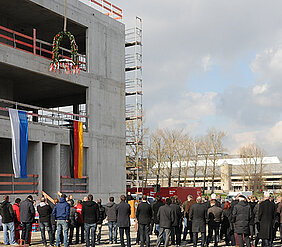New research institute for boron chemistry
04/18/2016A planned research building hits the home stretch: The German Science Council has approved the construction of a new chemistry institute for the University of Würzburg to be built on the Hubland campus.

On 15th April 2016, the German Science Council has given support for two research building projects at Bavarian Universities, namely a research building for astro-particle physics at the University of Erlangen-Nuremberg and for an “Institute of Sustainable Chemistry and Catalysis with Boron as a Key Element” (ICB) of the Julius-Maximilians-University of Würzburg, JMU. The German Science Council has communicated this via a press release.
In the ICB, Würzburg Professors Holger Braunschweig and Todd Marder plan to establish an internationally leading Center of Excellence focusing on the chemistry of the element boron and its usage to find solutions to the challenges of energy and resource conservation.
Boron is becoming increasingly important for synthetic chemistry and materials sciences because of its unique characteristics. In organic synthesis, it is nearly universally applicable, for example, in the formation of new bonds between carbon and a wide variety of elements and groups. Moreover, boronate ester compounds are becoming more important for large chemical processes and the synthesis of fine chemicals for pharmaceutical, agrochemical, and materials applications.
Facts about the new institute building
The new institute will be built at the chemistry center on the Hubland campus next to the Institute of Inorganic Chemistry, where the research groups of Braunschweig and Marder are located.
The building will have an effective area of approximately 1,400 square meters on four floors, with a total cost estimated to be 19.4 million euros. Construction is expected to begin in 2017, with completion in 2021.
GWK makes final decision
Joint Science Conference (GWK) of federal and state governments makes the final decision on the new building based on the recommendations of the German Science Council. The funding of this new research building will be shared between the Free State of Bavaria and the federal government of Germany.
About the German Science Council
The German Science Council advises the federal government and the governments of the states in questions of content and structural development of universities, science and research. Visit the website of the German Science Council for more information: www.wissenschaftsrat.de






